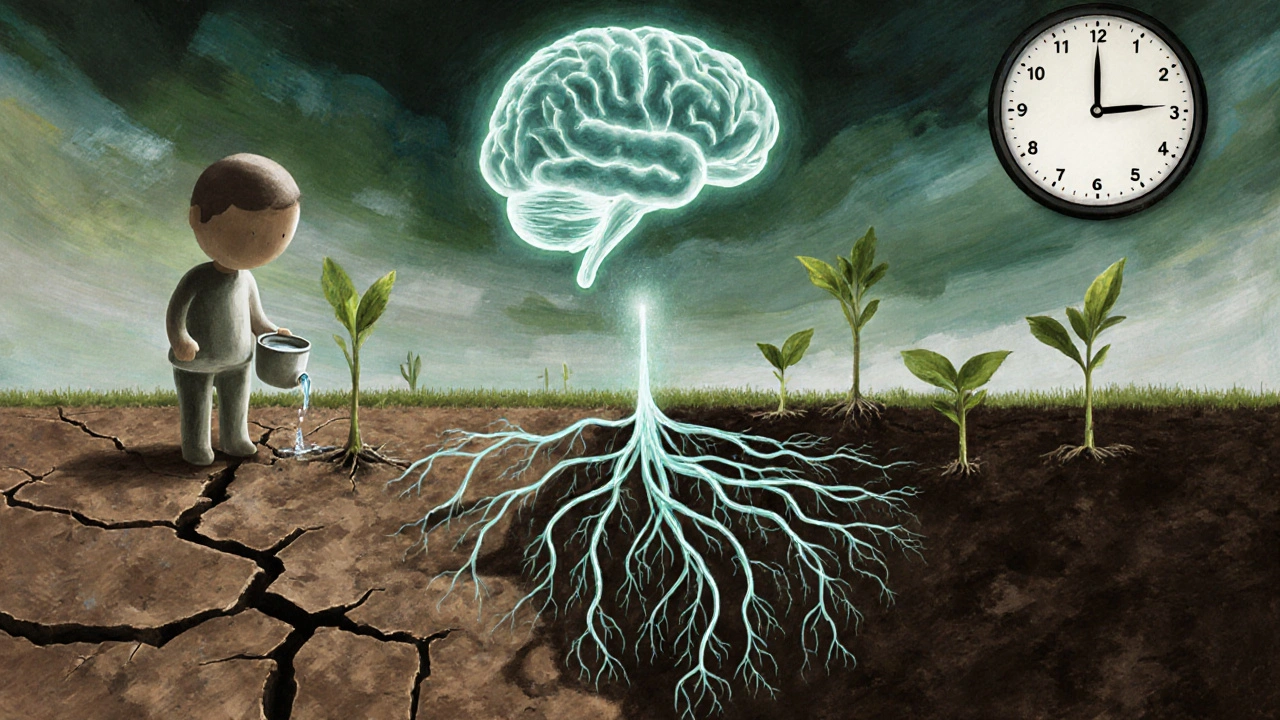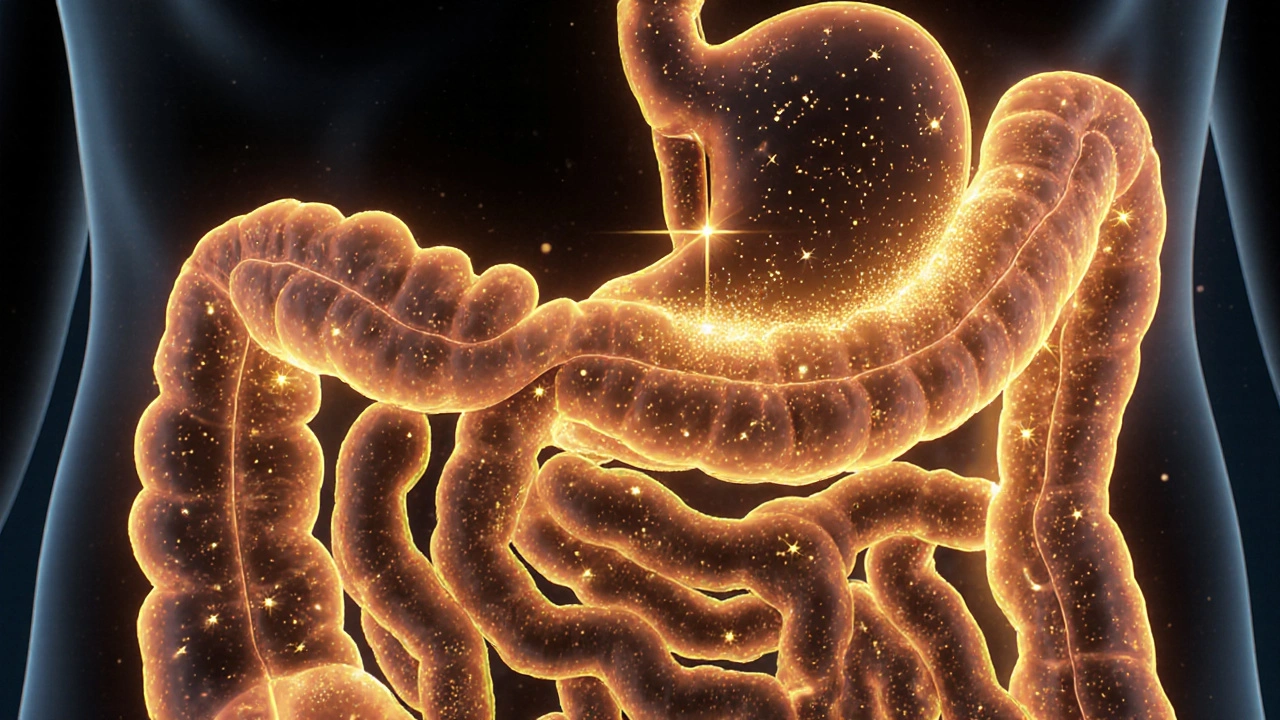Gut Health Assessment Quiz
How Well is Your Gut Functioning?
Take this 5-minute assessment to understand your gut health status and get personalized recommendations based on your answers.
Your Gut Health Assessment
4-7 = Moderate imbalance
8-11 = Healthy balance
12-15 = Optimal gut health
What if the key to feeling better-less bloating, fewer cravings, clearer skin, even better mood-was hiding in your belly? Not some magic pill or expensive supplement. Just your gut. The truth is, your digestive system isn’t just about breaking down food. It’s your body’s command center for immunity, hormone balance, and even how you think and feel. A healthy gut isn’t a buzzword. It’s the foundation of real, lasting health.
What Your Gut Actually Does
Your gut is a 30-foot-long tube running from your mouth to your anus. But what most people don’t realize is that it’s home to trillions of bacteria, viruses, and fungi-collectively called the gut microbiome. These tiny organisms don’t just sit there. They’re working nonstop. They help digest fiber you can’t break down on your own. They make vitamins like B12 and K. They train your immune system to tell the difference between harmful invaders and harmless food particles. And they send signals straight to your brain through the vagus nerve.
When this system works right, you feel it. You digest meals without discomfort. You don’t get sudden sugar crashes. Your energy stays steady. But when it’s out of balance? That’s when bloating, constipation, acid reflux, and even anxiety start showing up.
The Gut-Brain Connection Is Real
You’ve probably heard someone say, ‘I had a gut feeling.’ Turns out, that’s not just poetry. About 90% of serotonin-the chemical linked to mood and happiness-is made in your gut. When your gut bacteria are unhealthy, they produce inflammatory compounds that can travel to your brain. Studies have shown a clear link between gut imbalance and conditions like depression, anxiety, and brain fog.
One 2023 study tracked 1,200 adults over a year and found that those with low microbial diversity in their gut were 40% more likely to report persistent low mood. It’s not that gut problems cause depression. But they make it harder for your brain to stay balanced. Fix your gut, and you often start feeling more like yourself again.
What Kills Your Gut Health
It’s not just junk food. Modern life wears down your gut in quiet, sneaky ways:
- Antibiotics: Even one course can wipe out good bacteria for months. They don’t distinguish between bad and good bugs.
- Processed sugars: These feed the bad bacteria and yeast, letting them overgrow and cause inflammation.
- Chronic stress: When you’re stressed, your body shuts down digestion. Blood flow leaves your gut. Stomach acid drops. Your gut lining gets more permeable-leading to ‘leaky gut’.
- Low-fiber diets: If you’re not eating enough vegetables, beans, whole grains, and fruits, your good bacteria starve. They need fiber to thrive.
- Artificial sweeteners: Surprisingly, studies show sucralose and aspartame can alter gut bacteria in ways that promote glucose intolerance.
It’s not about being perfect. It’s about recognizing patterns. If you’ve been feeling off for months and you’re eating the same meals every day, your gut might be screaming for a change.
How to Build a Healthy Gut
There’s no single miracle food. But there are simple, science-backed habits that make a difference:
- Eat more fiber: Aim for 30-40 grams a day. That’s about 5 servings of vegetables, a cup of lentils, a handful of berries, and a slice of whole grain bread. Fiber feeds good bacteria and keeps things moving.
- Include fermented foods: Sauerkraut, kimchi, plain yogurt, kefir, miso, and kombucha contain live cultures. Just 1-2 tablespoons a day can help repopulate good bacteria. Avoid sugary versions-check labels.
- Stay hydrated: Water keeps your gut lining moist and helps fiber do its job. If you’re not drinking enough, even high-fiber meals can make you feel bloated.
- Chew your food: Digestion starts in your mouth. Chewing breaks food into smaller pieces and signals your stomach to release enzymes. Eating too fast overwhelms your system.
- Manage stress daily: Even 5 minutes of deep breathing or walking outside lowers cortisol. Try eating without screens. Your gut responds to calm.
These aren’t trends. They’re basic human biology. You don’t need a detox or a 14-day cleanse. Just consistency.

Signs Your Gut Needs Help
Not everyone has the same symptoms. But here are the top 5 red flags:
- Constant bloating or gas after meals
- Irregular bowel movements (too frequent, too hard, or too loose)
- Food intolerances that popped up out of nowhere
- Unexplained fatigue or brain fog
- Skin issues like eczema, acne, or rosacea that don’t respond to creams
If you have two or more of these, your gut is likely out of balance. It’s not ‘just digestion.’ It’s your body telling you something’s off.
What About Probiotics and Supplements?
Probiotic supplements can help-but only if your foundation is solid. Taking a pill won’t fix a diet full of sugar and processed food. If you’re already eating fiber-rich meals and fermented foods, then a high-quality probiotic (with at least 10 billion CFUs and multiple strains like Lactobacillus and Bifidobacterium) can be a useful boost.
Prebiotics are just as important. These are fibers that feed good bacteria. Garlic, onions, leeks, asparagus, and chicory root are top sources. Many people take prebiotic supplements like inulin-but food sources work better and come with other nutrients.
Don’t waste money on ‘gut health’ powders with 20 ingredients you can’t pronounce. Stick to whole foods first. Supplements are support, not substitutes.
How Long Does It Take to Heal Your Gut?
It’s not instant. But you’ll notice changes faster than you think. Most people report less bloating and more energy within 2-3 weeks of eating more fiber and cutting sugar. Gut lining repair takes longer-usually 6-8 weeks. Full microbiome rebalancing can take 3-6 months, depending on how long things have been off.
Think of it like gardening. You don’t pull a weed and expect a rose to bloom overnight. You clear the soil, add compost, water regularly, and wait. Your gut works the same way.

What to Avoid
Some habits are harder to break, but they’re worth it:
- Drinking alcohol daily-even one glass can disrupt your gut lining.
- Snacking constantly. Your gut needs downtime to clean itself between meals.
- Using NSAIDs like ibuprofen too often. They damage the gut lining over time.
- Ignoring food sensitivities. If dairy or gluten makes you feel awful, don’t just ‘push through it.’
Real-Life Results
A 38-year-old teacher from Hamilton started having daily bloating and fatigue after her third child. She cut out sugary snacks, added lentils and sauerkraut to her meals, and started chewing each bite 20 times. Within three weeks, her energy returned. By six weeks, her skin cleared up. She didn’t take a single supplement. Just changed how she ate.
Another client, a 52-year-old accountant, had acid reflux for 12 years. He was on PPIs. He switched to eating earlier in the evening, stopped drinking wine after 7 p.m., and added a daily walk after dinner. His reflux disappeared in 10 weeks. His doctor took him off the medication.
These aren’t outliers. They’re normal people who listened to their bodies.
Your Next Step
You don’t need to overhaul your life tomorrow. Pick one thing:
- Add one serving of vegetables to lunch.
- Swap your afternoon candy bar for a handful of almonds and an apple.
- Drink a glass of water before every meal.
- Take 5 minutes after dinner to breathe slowly.
Small changes stack up. Your gut doesn’t care about perfection. It just wants consistency. Start there. Feel the difference. Then keep going.
What foods are best for a healthy gut?
Focus on fiber-rich plants: vegetables, fruits, legumes, whole grains, nuts, and seeds. Add fermented foods like plain yogurt, kefir, sauerkraut, kimchi, and miso. These feed good bacteria and help them thrive. Avoid sugary, processed versions-check labels for added sugar or vinegar.
Can stress really affect my digestion?
Yes. When you’re stressed, your body goes into survival mode and shuts down digestion. This reduces stomach acid, slows motility, and weakens the gut barrier. Chronic stress is linked to bloating, constipation, and leaky gut. Even short daily practices like deep breathing or walking can help reset your nervous system and improve gut function.
Do I need to take probiotic supplements?
Not if you’re eating enough fiber and fermented foods. Supplements can help if you’ve recently taken antibiotics or have a diagnosed imbalance, but they’re not a replacement for good food. Look for products with at least 10 billion CFUs and multiple strains like Lactobacillus and Bifidobacterium. Always store them properly-many need refrigeration.
How do I know if I have leaky gut?
Leaky gut isn’t officially recognized as a medical diagnosis, but many functional practitioners see it as increased intestinal permeability. Signs include food sensitivities, chronic inflammation, fatigue, and skin issues like eczema. If you suspect this, focus on removing triggers (sugar, alcohol, processed foods), healing the gut lining with bone broth, zinc, and glutamine, and reducing stress. Blood tests for zonulin or lipopolysaccharides exist but aren’t widely available or standardized.
Can a healthy gut help with weight loss?
Not directly-but it helps indirectly. A balanced gut reduces inflammation, which can improve insulin sensitivity and reduce cravings. People with healthy microbiomes tend to feel fuller longer and have more stable energy. Weight loss isn’t about pills or extreme diets. It’s about creating a gut environment that supports natural, sustainable metabolism.
Is there a connection between gut health and immunity?
Yes. About 70% of your immune system lives in your gut. Good bacteria train your immune cells to recognize threats and ignore harmless substances. When your microbiome is out of balance, your body can overreact-leading to allergies, autoimmune issues, or frequent colds. Eating diverse plants and avoiding antibiotics unless necessary helps keep your defenses strong.





